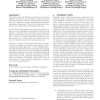Free Online Productivity Tools
i2Speak
i2Symbol
i2OCR
iTex2Img
iWeb2Print
iWeb2Shot
i2Type
iPdf2Split
iPdf2Merge
i2Bopomofo
i2Arabic
i2Style
i2Image
i2PDF
iLatex2Rtf
Sci2ools
139
click to vote
HPDC
2009
IEEE
2009
IEEE
TakTuk, adaptive deployment of remote executions
This article deals with TakTuk, a middleware that deploys efficiently parallel remote executions on large scale grids (thousands of nodes). This tool is mostly intended for interactive use: distributed machines administration and parallel applications development. Thus, it has to minimize the time required to complete the whole deployment process. To achieve this minimization, we propose and validate a remote execution deployment model inspired by the real world behavior of standard remote execution protocols (rsh and ssh). From this model and from existing works in networking, we deduce an optimal deployment algorithm for the homogeneous case. Unfortunately, this optimal algorithm does not translate directly to the heterogeneous case. Therefore, we derive from the theoretical solution a heuristic based on dynamic work-stealing that adapts to heterogeneities (processors, links, load, ...). The underlying principle of this heuristic is the same as the principle of the optimal algorithm...
Distributed Computing | HPDC 2009 | Parallel Remote Executions | Remote Executions | Remote Executions Deployment |
Related Content
| Added | 21 May 2010 |
| Updated | 21 May 2010 |
| Type | Conference |
| Year | 2009 |
| Where | HPDC |
| Authors | Benoit Claudel, Guillaume Huard, Olivier Richard |
Comments (0)

